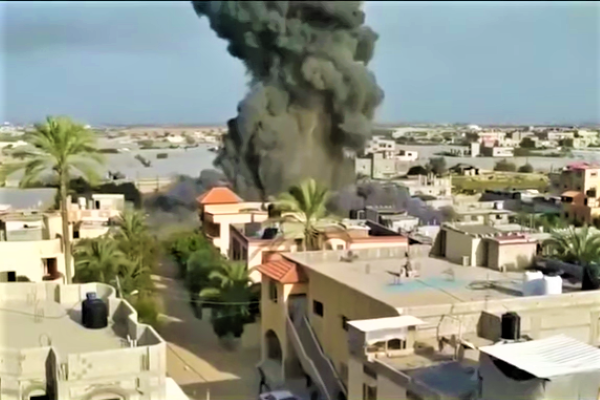The ideal era is when, according to Isaiah’s prophecy, there will be no more war. But until that prophecy is fulfilled, there are times when war is required, justified, and even encouraged.
By Rabbi Ari Enkin, Rabbinic Director, United with Israel
This week’s Torah portion is “Matot” and in it we read about the revenge attack on the Midianites.
After the Midianite women successfully enticed the Jewish men into idolatry and immorality, God told Moses to take revenge. Kill them all. Men and women. Plunder their possessions. Take the spoils.
What’s going on over here? A revenge war? Extermination of a nation? What about looting? Is this a Jewish thing to do? Let’s take a look at some of the issues.
Of course, we believe that the ideal state and era is when “they shall beat their swords into ploWShares, and their spears into pruning hooks; nation shall not lift up sword against nation, neither shall they learn war any more.” (Isaiah. 2:4).
However, that is a prophecy for the future, not the reality of today. Before that prophecy is fulfilled there are times when war is required, justified, and even encouraged.
But even in war, there are rules. As the Torah says, “When you go forth against your enemies…you shall keep yourselves away from every evil thing.”
Why is it so important to maintain as much dignity as possible in war? “Because the Lord your God walks in the midst of your camp, to save you and to give up your enemies before you; therefore your camp must be holy, that He may not see anything indecent among you, and turn away from you” (Deut. 23:15).
A soldier is not allowed to exercise excessive force or brutality in war. That being said, the Torah recognizes that in order to achieve military objective, a balance must be found between the nature of soldiers in war who must behave differently in war than in peace. The Torah requires compassion and holiness even in war, but we must not forget that the enemy is the enemy. In the words of the Talmud: “If someone rises up to kill you, kill him first.”
Even when war is justified and a mitzvah (Torah commandment), it still has negative repercussions. For example, King David’s wars were all approved by God but nevertheless David was not allowed to build the Temple because he had established himself as a man of the sword more than as a man of the sanctuary. (I Chron. 22:7–10).
From the Torah’s perspective there are two types of wars: optional wars and obligatory wars. Some examples of an obligatory war are the commandments in this week’s Torah portion to exterminate the Midianites for them having successfully seduced many into idolatry and immorality, to conquer the land of Israel, to drive out the Seven Nations (the Hittites, Girgashites, Amorites, Canaanites, Perizzites, Hivites, and Jebusites), to exterminate the nation of Amalek, and to defend the nation when attacked.
An example of an optional war is a war waged to expand the borders of the land for whatever reason doing so is deemed necessary. It must be noted, however, that the ancient nations of the world have assimilated into oblivion and there is no way to identify the Seven Nations or the Amalekites. As such, there are no commandments to exterminate any nation today.
Although the State of Israel drafts soldiers at 18 years old, the Torah only calls to do so from the age of 20. The Torah also lists its own criteria for exemption from military service: (a) one who built a home but has not yet dedicated it; (b) one who has planted a vineyard but not yet enjoyed its fruit; (c) one who has betrothed a woman but not yet married her; and (d) one who is afraid of war.
Nevertheless, even those who were exempt from battle were required to contribute to the war effort by providing food and water for the soldiers and taking care of other communal needs. So too, according to most opinions, the exemption from war was only for optional war. In an obligatory war, however, even a bride and groom were expected to fight!
Looting the spoils of war is all over the bible and seems to have been tolerated if not outright encouraged (Gen 11:24, 1 Sam. 30:24, Deut. 20:14). Some explain the permission to loot was payment to the soldiers for their work. Indeed, the spoils of war had to be divided evenly between those on the front lines and those on the back lines.
May we soon see the days of when “they shall beat their swords into ploughshares, and their spears into pruning hooks; nation shall not lift up sword against nation, neither shall they learn war any more!!” (Isaiah. 2:4)
For more insights by Rabbi Enkin on this week’s Torah reading, click on the links below.
https://unitedwithisrael.org/living-torah-unlocking-the-hidden-power-of-our-words/
https://unitedwithisrael.org/webinar-greater-israel-discover-the-real-borders-of-the-land-of-israel/
https://unitedwithisrael.org/living-torah-how-to-make-lifes-bitter-moments-sweet/
https://unitedwithisrael.org/watch-remember-the-kindness/
https://unitedwithisrael.org/living-torah-dont-make-the-gad-and-reuben-mistake/
MAKE THE LAND OF ISRAEL EVEN MORE BEAUTIFUL!
PLANT YOUR VERY OWN FRUIT TREES IN ISRAEL!
Farmers near the Gaza border lost family, friends and workers. Spring is here, and they desperately need help to replant the farms. Join us in blessing the People and Land of Israel.
“I will ordain My blessing for you…” (Leviticus 25:4)
